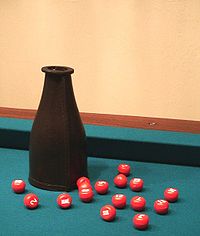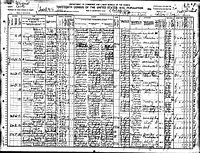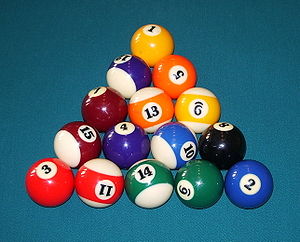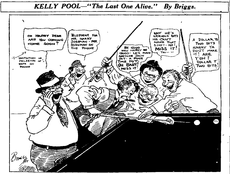
Kelly pool
Encyclopedia

Pocket billiards
Pool, also more formally known as pocket billiards or pool billiards , is the family of cue sports and games played on a pool table having six receptacles called pockets along the , into which balls are deposited as the main goal of play. Popular versions include eight-ball and nine-ball...
game played on a standard pool table using fifteen numbered markers called peas or pills, and a standard set of sixteen pool balls
Billiard ball
A billiard ball is a small, hard ball used in cue sports, such as carom billiards, pool, and snooker. The number, type, diameter, color, and pattern of the balls differ depending upon the specific game being played...
. Gameplay involves players drawing peas at random from a , which assigns to them the correspondingly numbered pool ball, kept secret from their opponents, but which they must pocket in order to win the game. Kelly pool is a game, which means that players must contact the lowest numbered on each shot first until the opportunity to pocket their own is presented. Two rule variants are set forth under rules promulgated by the Billiard Congress of America
Billiard Congress of America
Billiard Congress of America is a governing body for cue sports in North America , the regional member organization of the World Pool-Billiard Association...
(BCA). In the simpler form, the object of play starts and ends with the goal of pocketing one's secret ball. In the second, in addition to the goal of pocketing one's secret ball, points are scored in various ways.
Reportedly invented by Chicagoan Calistus "Kelly" Mulvaney in 1893, kelly pool was a popular game during the early- to mid-20th century. Mentions of it were at one time common in US newspapers, often painting it in a negative light as its play was considered a stronghold of gambling. Authorities in various parts of the United States at times called for a moratorium on the game's play. Until 1964, in fact, playing the game was a fineable offense in the state of Montana.
Many billiard-specific and etymological sources point to kelly pool, or an early version of the game called kelly rotation, as the origin of the common idiom
Idiom
Idiom is an expression, word, or phrase that has a figurative meaning that is comprehended in regard to a common use of that expression that is separate from the literal meaning or definition of the words of which it is made...
, "behind the eight ball". Some publications blithely assume the expression to be eponymously derived from the game of eight ball
Eight ball
Eight-ball is a pool game popular in much of the world, and the subject of international professional and amateur competition...
, but is has been pointed out that the expression came into use before eight ball was popularized, and that the game did not even use an actual 8 ball under the version first marketed to the public. The predecessor to the BCA, The National Billiard Association, meanwhile, holds that the expression simply emanates from the fact that the eight ball, being black-colored, is harder to see than other balls, thus resulting in an association with any difficult position.
Origins

Chicago Tribune
The Chicago Tribune is a major daily newspaper based in Chicago, Illinois, and the flagship publication of the Tribune Company. Formerly self-styled as the "World's Greatest Newspaper" , it remains the most read daily newspaper of the Chicago metropolitan area and the Great Lakes region and is...
, "Kelly pool was invented by Kelly Mulvaney". The quote is attributed in the article to Hugh E. Keough, a well-known Chicago sportswriter of 31 years. Further information is provided in a November 10, 1916 Indianapolis Star obituary for one Calistus Mulvaney, who is listed as having died the preceding day. The obituary, entitled "Originated 'Kelly Pool, states that: "... for thirty five years [Mulvaney] was identified with Kelly pool in the loop district ... He was widely known as the father of 'Kelly pool' and better known as Kelly Mulvaney than Calistus. He was born at Fox Lake Wis[consin] sixty-five years ago."
In Calistus Mulvaney's entry in the 1910 United States Census (pictured at right), his occupation is listed as "billiard hall emp[loyee]" and his position there as "keeper". As part of the same household, Mulvaney's brother-in-law's listing appears on the same census page, with his occupation and position identically recorded. The census records Mulvaney's age in 1910 as 56, his birthdate as "about 1854", his birthplace as Wisconsin, his spouse's name as Kate, and his area of residence at that time as Chicago Ward 14, Cook Co., Illinois. Although there is a given-name discrepancy, additional illumination is provided by Simpson M. Ritter in the publication From the Annals of Sports. As Simpson is quoted in the book Sports in the Pulp Magazines by John A. Dinan:
Gameplay
Kelly pool accommodates players with a wide variety of skill levels. The game is designed for group play with a minimum of 2 players, best suited for 4–6, but allowing up to 15 to take part. The Billiard Congress of AmericaBilliard Congress of America
Billiard Congress of America is a governing body for cue sports in North America , the regional member organization of the World Pool-Billiard Association...
(BCA) publishes a long-standardized set of rules for the game.
Set up

At the start of the game a standard set of fifteen pool object balls are racked at the end of a pool table, with the of the rack centered over the . Viewed from the racker's vantage point, the 1 ball is placed at the rack's apex, the 2 ball at the rack's right corner and the 3 ball at the rack's left corner (as in the game of rotation); all other object balls are placed randomly. An is required, meaning that at least four balls must be driven to rails (as opposed to a , such as is used for the opening break in straight pool
Straight Pool
Straight pool, also called 14.1 continuous or simply 14.1, is a pocket billiards game, and was the common sport of championship competition until overtaken by faster-playing games like nine-ball...
and one-pocket).
Rules of play
Kelly pool is a game, which means that the lowest numbered ball on the table must be contacted by the cue ball on every shot. There are no called in kelly pool; the legal pocketing (i.e., with no committed on the same ) of the lowest numbered ball on the table, permits and requires the shooter to continue play. When a ball is illegally pocketed it is to the foot spot (or as close as possible, toward the ).If a foul is committed, there is no point penalty and the incoming player has the option of accepting the table in position, or requiring the offending player to continue shooting. However, when the foul is the result of jumping the cue ball off the table, or it into a pocket, the incoming player has from the (behind the ), and retains the option of forcing the opponent to shoot. Whichever player ultimately shoots with cue ball in hand has the option of spotting the object ball to the foot spot if it is in the kitchen area.
Scoring
There are two main scoring variations; under the first and simpler ruleset, the first player to pocket his private number wins. Under the second variation, although a player still wins by pocketing his private number, points are scored in various ways: 1) two points are given by each participant to the winning player for the pocketing of his private number; 2) a player receives one point for pocketing any other player's private number, and the player whose private number was pocketed is penalized one point (and can have a negative point total), but is not out of the game and can still win points in this way; 3) if a player whose private number is pocketed by another does not disclose this fact before a subsequent shot is taken, the non-disclosing player forfeits, immediately losing the game, and the player who made that ball is given two points instead of one. In the event that no player succeeds in pocketing his private number, gameplay ends when the last private number is potted, and the game is played again with all points values doubled.Association with gambling

Manitoba
Manitoba is a Canadian prairie province with an area of . The province has over 110,000 lakes and has a largely continental climate because of its flat topography. Agriculture, mostly concentrated in the fertile southern and western parts of the province, is vital to the province's economy; other...
at least as of 1918. Gambling exploits associated with kelly pool were often depicted in Clare Briggs
Clare Briggs
Clare A. Briggs was an early American comic strip artist who rose to fame in 1904 with his strip A. Piker Clerk. Briggs was best known for his later comic strips "When a Feller Needs a Friend," "Ain't It a Grand and Glorious Feeling?" and "The Days of Real Sport".-Early life:Born in Reedsburg,...
' comic strip of the same name, which centered on the game. The Kelly Pool strip (panel pictured at right), ran in the New York Tribune
New York Tribune
The New York Tribune was an American newspaper, first established by Horace Greeley in 1841, which was long considered one of the leading newspapers in the United States...
From the early- to mid-20th century numerous newspaper stories cover indictments of kelly pool as a bastion of gambling. In February 1908, the county attorney of Oklahoma City
Oklahoma city
Oklahoma City is the capital and largest city of the U.S. state of Oklahoma.Oklahoma City may also refer to:*Oklahoma City metropolitan area*Downtown Oklahoma City*Uptown Oklahoma City*Oklahoma City bombing*Oklahoma City National Memorial...
denounced kelly pool, declaring "that it comes with in [sic] the pale of the law against gambling", and issued orders to the city's sheriff's department to enforce a moratorium. In April 1912 a Vincennes, Indiana
Vincennes, Indiana
Vincennes is a city in and the county seat of Knox County, Indiana, United States. It is located on the Wabash River in the southwestern part of the state. The population was 18,701 at the 2000 census...
resident was indicted for embezzling $11,000 from the brick company he managed reportedly due "to his infatuation with 'pea' pool and shaking dice". The following month, Mayor Mudge of Edwardsville, Illinois
Edwardsville, Illinois
Edwardsville is a city in Madison County, Illinois, United States. As of the 2010 census, the city population was 24,293. It is the county seat of Madison County and is the third oldest city in the State of Illinois. The city was named in honor of Ninian Edwards, then Governor of the Illinois...
announced that "effective at once ... poolrooms ... must do away with all forms of gambling, including Kelly Pool." In the same vein, in 1914 Judge J.A. McIlvaine of a Washington, Pennsylvania
Washington, Pennsylvania
Washington is a city in and the county seat of Washington County, Pennsylvania, United States, within the Pittsburgh Metro Area in the southwestern part of the state...
court, in passing sentence on a pool room proprietor who allowed pea pool games to be wagered on in his establishment, announced that persons committing similar crimes would "be severely punished ... This is the most pernicious form of gambling for it starts youths to higher grades of crime."
In January 1916 a Washington D.C. billiard hall proprietor was fined $100 by a Police Court judge for allowing the game to be played at his establishment. The United States Attorney handling the case told reporters "There is considerable playing of this Kelly pool in the poolrooms of the city, where many young men lose their entire week's wages on a single Saturday night, and I propose to have it stopped, if possible." In April 1922, Charleston, West Virginia
Charleston, West Virginia
Charleston is the capital and largest city of the U.S. state of West Virginia. It is located at the confluence of the Elk and Kanawha Rivers in Kanawha County. As of the 2010 census, it has a population of 51,400, and its metropolitan area 304,214. It is the county seat of Kanawha County.Early...
's then mayor, Grant P. Hall, declared "baseball pools, pay-ball, Kelly pool and all other forms of gambling in billiard parlors and cigar stores must cease forthwith." Likewise, in December of the same year, Oxford, Ohio
Oxford, Ohio
Oxford is a city in northwestern Butler County, Ohio, United States, in the southwestern portion of the state. It lies in Oxford Township, originally called the College Township. The population was 21,943 at the 2000 census. This college town was founded as a home for Miami University. Oxford...
's then mayor, J. M. Hughes, declared a war on all forms of gambling, announcing in the local newspaper that "schemes of chance ... [including] Kelly pool ... are contrary to law." In 1934, sports promoter and notorious gambler Jack Doyle
Jack Doyle
Jack Doyle , known as "The Gorgeous Gael" was at one time or another a contender for the British Boxing Championship, a Hollywood actor and an accomplished tenor.-Early years:...
's billiard establishment was raided and he, along with 14 patrons, were arrested for placing bets on Kelly pool.
"Behind the eight ball"

Idiom
Idiom is an expression, word, or phrase that has a figurative meaning that is comprehended in regard to a common use of that expression that is separate from the literal meaning or definition of the words of which it is made...
meaning to be in trouble, stymied or thwarted, in an awkward position or out of luck. It is often assumed that the expression derives from the inability to use the 8 ball in a combination in the game of eight-ball—if the cue ball is directly behind the 8 ball a player has no direct shot route. Numerous billiards-specific and etymological publications state that the expression derives instead from kelly pool, or an early version of kelly pool called kelly rotation.
Billiards historian Michael Ian Shamos
Michael Ian Shamos
Michael Ian Shamos is an American mathematician, attorney, book author, journal editor, consultant and company director. He is Michael Ian Shamos (born April 21, 1947, and often referred to as Mike Shamos) is an American mathematician, attorney, book author, journal editor, consultant and company...
in The Illustrated Encyclopedia of Billiards (1993), citing information provided by Charles C. Peterson (first president of the Billiard Association of America), and Steve Mizerak
Steve Mizerak
Steve Mizerak , nicknamed "the Miz", was a world champion pool player dominant during the 1970s and early 1980s in the game of 14.1 continuous....
and Michael E. Panozzo in Steve Mizerak's Complete Book of Pool (1990), indicate that ascribing the phrase's origin to the game of eight ball results in an anachronism, the phrase being traceable to at least 1919, while the form of game that became "eight-ball" was not described by that name, and its rules were not published in any official rule book, until after 1940. The game that would ultimately be named "eight ball," after a physical 8 ball became part of play, was invented shortly after 1900. That precursor game was little known until it was popularized in 1925 under the name B.B.C. Co. Pool by the Brunswick-Balke-Collender Company, marketed by them with a special set of balls that did not have a numbered 8 ball, but rather came with a ball set consisting of seven of one color, seven of another, and an unnumbered black ball. Thus, multiple-time world champion Steve Mizerak explains that behind the eight ball cannot derive from the game of eight ball as "the phrase predates the game ... by at least 20 years."
Two different kelly pool-based derivations for behind the eight ball are provided in diverse sources. As noted, in kelly pool each player is randomly assigned a specific ball of the fifteen ball rack, which must be made in numerical order. The game ends when any player makes his assigned ball. Based on these rules, one origin theory holds that when a large number of players are participating, players assigned balls numerically higher than 8—that is, balls that are behind the 8 ball in order—have little chance of winning. This is a result of the likelihood that random distribution will result in multiple players with assigned balls numbered lower than 8 having an opportunity to shoot first, and that with such large a number of players at least one will come to the table with the opportunity to shoot at his assigned ball.
A second theory refers to a kelly pool rule variation under which the 8 ball is excluded from assignment as a secret number and, if another ball strikes the 8 ball at any time during play, the player responsible is penalized. "So a position directly behind the eight ball is a position of great hazard."
A more generic origin of the phrase that is independent of any particular game's rule, instead depending from a property of the 8 ball itself, is proffered by Billiard Congress of America predecessor, The National Billiard Association, which organization was the governing body of American billiards from 1921 to 1941:

